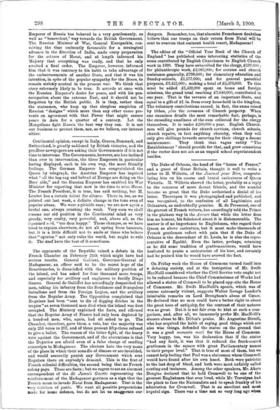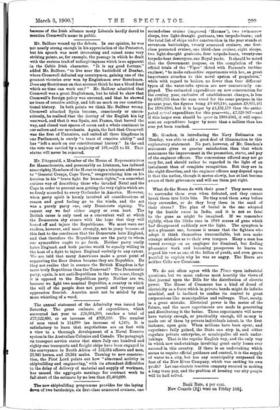On Friday week the House of Commons turned itself into
a debating society, and at the instigation of Mr. Swift MacNeill considered whether the Civil Service vote ought not to be reduced because the Chief Commissioner of Works had allowed a statue of Cromwell to be placed opposite the House of Commons. Mr. Swift MacNeill's speech, which was of course extremely violent, suggests Walter Savage Landor's inimitable remarks on Lord Brougham's abuse of Ca3sar. He declared that no man could have a better right to abuse the great hero of antiquity, for the contrast of their natures was so great. But it is not fair even to hint at such a com- parison, and, after all, we immensely prefer Mr. MacNeill's sincere abuse to Mr. Dillon's praise. Mr. Augustine Birrell, who has acquired the habit of saying good things which are also wise things, defended the statue on the ground that it was a good memento mori for the House of Commons. Very happy, too, was his declaration that if the statue "had any fault, it was that it reduced the frock-coated gentlemen in the square with great Parliamentary names to their proper level." That is true of most of them, but we cannot help feeling that Peel was a statesman whom Cromwell would have found after his own heart. Both were patriotic to the last drop of blood, and both were most unfairly called canting and insincere. Among the other speakers, Mr. Akers Douglas declared that he held Cromwell to be one of the greatest Englishmen that ever lived, while Mr. Trevelyan had the pluck to face the Nationalists and to speak frankly of his admiration for Cromwell. That is an excellent and most hopeful sign. There was a time not so very long ago when
because of the Irish alliance many Liberals hardly dared to mention Cromwell's name in public.







































 Previous page
Previous page